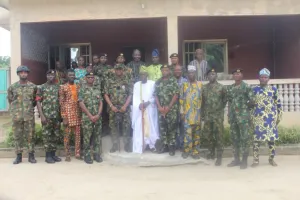This is the first time that we are focusing our editorial on oil and gas related issue. The reason is simple: Shipping Position Weekly newspaper only incorporated oil and gas as its components in January, 2009 and we think it will not be out of place to reveal our stand on the recurrent hard line posture of tanker drivers and subsequent face off with the government.
Since the petroleum tanker drivers under the umbrella of the National Union of Petroleum and Natural Gas Workers Union (NUPENG) woke up to realise in 1993 that they could hold the nation to ransom by withdrawing their trucks, they have continued to use it has a weapon to negotiate and have their way. Were it not for the political turmoil over the June 12, 1993 elections, tanker drivers may never realise how ‘powerful’ they are. Buoyed by the fierceness of its then-national secretary, Mr Frank Kokori, NUPENG successfully paralysed the nation’s socio-economy, and since then, any time NUPENG sneezes, the nation literally catches cold.
Last week’s face-off between the tanker drivers and officials of the Lagos State Traffic Management Authourity (LASTMA) is a spill over of past near clashes and actual clashes between them.
The clash which also led to the seizure of scores of petroleum tankers reverberated into a strike by NUPENG which ordered its members to withdraw their tankers from the roads. The resultant effect is fuel scarcity throughout the federation.
The genesis is the step by one of the companies; MRS Oil and Gas to utilise a holding bay which it acquired on the ever-busy Apapa Oshodi expressway. This drew many tankers to the large expanse of land. Many of the drivers who could not secure a space within the holding bay resorted to parking their trucks on the highway; a development which was resisted by officials of LASTMA.
We will like to recall that within the last week of June, 2008, the then minister of transportation, Mrs Deziani Allison Madueke met with stakeholders in the petroleum marketing and haulage business. At separate meetings with Depot and Petroleum Marketers Association (DAPPMA) as well as NUPENG and others, she reiterated government’s determination to put an end to indiscriminate parking of trucks on the expressway.
She consequently gave directives that owners of tank farms should construct holding bays. This order has been largely complied with as many holding bays have since been constructed either collectively by the depot owners of single handed by an operator. The one owned by MRS Oil and Gas along the Apapa Oshodi expressway from where the recent problem was ignited is an example of efforts by tank farm owners to comply with government’s directives as handed down by the minister.
We are wont to stress that petroleum truck drivers under the aegis of Petroleum Tanker Drivers’ branch of NUPENG have been holding the nation to ransom for too long.
Certain observations have come up since the recent face-off came up and we think that these comments are pointers to the fact that the country must find a more enduring solution to the perennial problem with transportation of petroleum products.
The commissioner of transportation, Lagos state, Professor Bamidele Badejo had in the wake of the crisis advised that government should explore the possibility of moving petroleum products by rail and by water. It is not that these options have never been there, but the political will to explore them has been largely absent.
An efficient rail system will not only ease pressure on our roads, but will also assist in the transportation of petroleum products. The same applies if we have well developed inland waterways system.
The frequent recalcitrant posture of tanker drivers is in response to the nation’s decayed infrastructures. How can a group hold the nation to ransom if not that the nation has made it indispensable.
Good enough, the nation’s rail system is already been reactivated, what is left is for the waterways to be made navigable such that barges can also be used to lift products.
















Discussion about this post